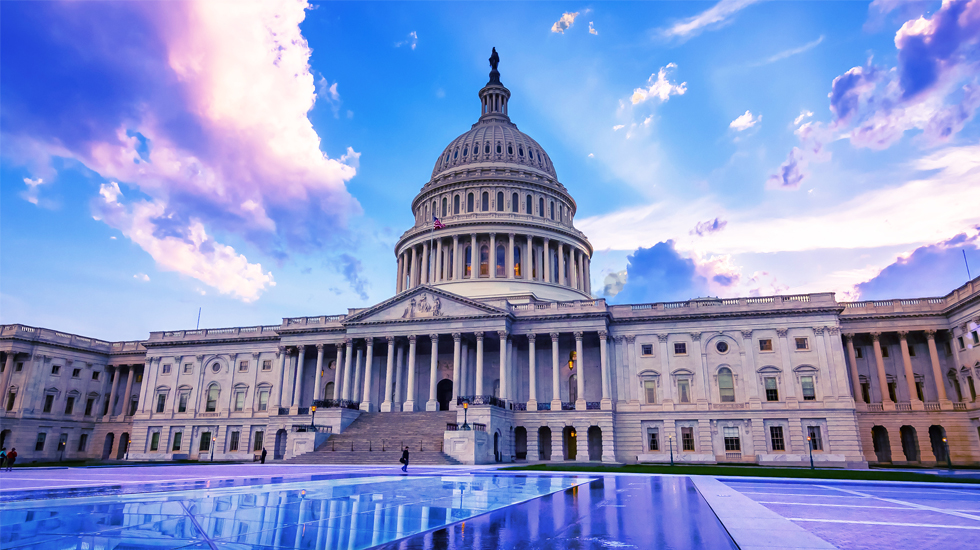KPMG Regulatory Insights
- Unique Action: Puts forth policy considerations (across funding, legislation/regulatory actions, further areas of study) based on a Senate AI Working Group, garnering input and perspectives across nine (9) AI Insight Forums and numerous committee hearings.
- Bipartisan Issuance: Recognizes profound changes from AI and sets directional agreement on the key areas of potential future policy development, including funding for research and development and confirming use of current legislation/rulemaking to AI as feasible.
- Policy Principles: Generally aligns with and supports key tenets of frameworks and actions being taken across regulatory agencies under the AI Executive Order (e.g., safeguarding, privacy, fairness, security).
__________________________________________________________________________________________________________________________________________________
May 2024
The Bipartisan Senate AI Working Group releases a report, “Driving U.S. Innovation in Artificial Intelligence: A Roadmap for Artificial Intelligence Policy in the United States Senate” (“Policy Roadmap”). The Policy Roadmap builds on AI initiatives already undertaken and ongoing at the federal level and is intended to “stimulate momentum for new and ongoing consideration of bipartisan AI legislation.” It includes recommendations for potential:
- Funding priorities (e.g., NIST AI testing and evaluation infrastructure; cross-government AI R&D)
- Legislative/regulatory actions (e.g., identifying gaps in the application of existing laws to AI systems; watermarking and digital content provenance)
- Areas for further study or consideration (e.g., public/private partnerships; long-term impact on future of work, certain professions or populations)
The report follows from a series of “educational briefings” on AI for senators and nine AI Insight Forums hosted by the AI Working Group during the fall of 2023, in which more than 150 representatives from industry, academia, and civil society participated. The AI Working Group states that the Policy Roadmap summarizes findings from the Insight Forums and lays out potential policy priorities for relevant committees working on AI legislation during the current legislative session (i.e., 118th Congress) and beyond.
Examples of recommendations contained in the Policy Roadmap are outlined below.
1. Funding Priorities
Activity/Topic
| Recommendations include:
|
|---|
U.S. Innovation, R&D, and the Workforce
| - Support National Science Foundation (NSF) Directorate for Technology, Innovation, and Partnerships; Department of Commerce (DOC) Regional Tech Hubs; Department of Energy (DOE) National Labs and Microelectronics Programs; NSF Education and Workforce Programs.
- Fund cross-government AI R&D effort, including infrastructure and all-of-government "AI-ready data" initiative, with a focus on responsible innovation and fundamental/applied science.
|
Bolstering DOC (NIST and the Bureau of Industry and Security (BIS))
| - Invest in AI testing and evaluation infrastructure and the U.S. AI Safety Institute; address maintenance backlog.
- Upgrade IT infrastructure, enhance personnel and monitoring capabilities for export control compliance.
|
Modernization of Government Services
| - Fund modernization efforts, including IT infrastructure updates to use AI technologies.
|
Interagency Coordination
| - Support R&D and coordination on AI and critical infrastructure, like smart cities and intelligent transportation.
|
National Security Threats and Risks
| - Fund efforts in national security, including national nuclear security administration (NNSA) testbeds, chemical, biological, radiological, and nuclear (CBRN) threat mitigation, AI-augmented chemical/ biological synthesis, and Department of Defense’s (DOD) AI-related work.
|
Semiconductors
| - Invest in semiconductor R&D for the design and manufacturing of AI chips, ensuring American leadership in AI and new semiconductor fabrication techniques.
|
Expansion of the National AI Research Resource (NAIRR)
| - Pass and fund the CREATE AI Act to authorize and expand NAIRR, ensure participation from all 50 states.
|
Challenge programs
| - Fund AI Grand Challenge programs inspired by DARPA, DOE, and NSF successes, focusing on technical innovation in science, engineering, or medicine.
|
AI and Robotics
| - Support R&D at the intersection of AI and robotics; develop a NIST and DOE testbed for new materials supporting advanced manufacturing.
|
Elections
| - Provide local election assistance funding for AI readiness and cybersecurity through HAVA Election Security grants.
|
Note: The Policy Roadmap seeks at least $32 billion annually for non-defense AI innovation to align federal investment in AI with recommendations by the National Security Commission on Artificial Intelligence (NSCAI), with specific focus on cross-government AI research and development (R&D), infrastructure, and responsible innovation.
2. Legislative/Regulatory Actions
Activity/Topic
| Recommendations include:
|
|---|
U.S. Innovation, R&D, and the Workforce
| - Develop legislation leveraging public-private partnerships to support AI advancements and minimize risks.
- Explore legislation related to training, retraining, and upskilling for an AI-enabled economy, including improvements to the immigration system for high-skilled STEM workers.
|
National Security Threats and Risks
| - Develop legislation bolstering AI use in cyber capabilities and ensuring DOD access to AI capabilities.
|
High Impact Uses of AI
| - Identify gaps in existing law application to AI systems; impose requirements on high-risk AI uses (e.g., transparency, explainability, testing).
- Develop legislation to support AI use standards in critical infrastructure.
- Support streamlining of federal procurement process for AI systems and other software that meets testing and evaluation standards.
|
Privacy and liability
| - Data privacy legislation to protect personal information and address issues related to data minimization, security, consumer rights, consent and disclosure, and data brokers.
|
Transparency, explainability, intellectual property, and copyright
| - Establish transparency requirements for AI systems (e.g., best practices for AI deployers’ product disclosures).
- Incentivize providers of software products using GenAI and hardware products (e.g., cameras, microphones) to provide content provenance information, and for online platforms to maintain access to that information.
|
Safeguarding against AI risks
| - Support efforts related to development of a capabilities-focused, risk-based approach, particularly for development and standardization of risk testing and evaluation methodologies and mechanisms (e.g., red-teaming, sandboxes and testbeds, commercial AI auditing standards, bug bounty programs, and physical and cybersecurity standards).
- Develop an analytical framework that specifies what circumstances would warrant a requirement of pre-deployment evaluation of AI models.
|
AI and Robotics
| - Develop a federal framework for testing and deployment of autonomous vehicles across all modes of transportation to remain competitive.
|
Elections
| - Advance effective watermarking and digital content provenance for AI-generated election content.
|
Protecting children
| - Address AI-generated child sexual abuse material (CSAM) and consider protections against such risks in product design and operation.
|
Discrimination and social scoring
| - Consider legislation prohibit the use of AI for social scoring, ensuring freedom from such systems.
|
Healthcare
| - Support further AI deployment in healthcare with guardrails to protect patients and promote data governance, transparency, and accuracy.
- Consider legislation that would provide transparency for providers and the public about the use of AI in medical products and clinical support services, including the data used to train the models.
- Provide proper tools to the Department of Health and Human Services (HHS), Food and Drug Administration (FDA), and Office of the National Coordinator for Health Information Technology to evaluate AI-enabled products’ benefits and risks.
|
3. Areas for Further Study or Consideration
Activity/Topic
| Recommendations include:
|
|---|
U.S. Innovation, R&D, and the Workforce
| - Study the impact of AI on jobs, including through stakeholder outreach, and explore strategies for workforce development and adaptation.
|
Bolstering DOC (NIST and the Bureau of Industry and Security (BIS))
| - Encourage Congressional committees to work with DOC and other agencies to increase access to tools, such as mock data sets, for AI companies to utilize for testing.
- DOC, Small Business Administration (SBA), and other agencies to conduct outreach to small businesses to ensure adequacy of AI tools.
|
National Security Threats and Risks
| - Continue to evaluate the evolving landscape of AI in national security and the capabilities of adversaries.
- Develop a framework for determining when to apply export controls to AI systems.
|
High Impact Uses of AI
| - Investigate the societal implications and regulatory needs of AI in critical sectors (e.g., housing, news/ journalism, etc.).
|
Privacy and liability
| - Consider standards or clarity around existing standards for AI developer/deployer liability.
- Explore policy mechanisms to minimize non-public personal information stored or used by AI systems.
|
Transparency, explainability, intellectual property, and copyright
| - Evaluate potential need for best practices for the level of automation appropriate for a given task, considering the need to have human involvement at certain stages for some high impact tasks.
- Consider federal policy issues related to the data sets used by AI developers to train models (e.g., whether data sets contain sensitive personal data or are copyright protected) and evaluate potential need for transparency requirements.
- Consider potential need for protections against unauthorized use of one's identity (i.e., name, image, likeness, voice, etc.) in synthetic content.
|
Safeguarding against AI risks
| - Explore policy implications of different product release choices for AI systems, particularly closed vs. fully open-source models, as well as the full spectrum of release choices between them.
- Explore mechanisms to deter use of AI to perpetrate fraud and deception, particularly for vulnerable populations.
|
Note: For further information on U.S. AI initiatives please see these KPMG materials:




